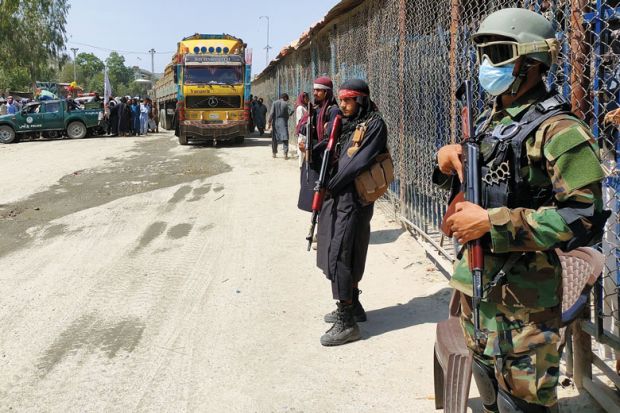The UK government has been urged to provide visas to Afghan scholars and activists who worked with British researchers and are now at “great risk” from the Taliban, with ministers accused of “negligent” failure to respond to their applications for resettlement.
A group of UK-based academics who worked on Official Development Assistance-funded projects in the country is calling for ministers to support about 350 Afghan citizens.
One of that group, Brad Blitz, professor of international politics and policy at UCL, co-investigator on a UK Research and Innovation Global Challenges Research Fund (GCRF) project on migration that worked in Afghanistan, said: “These are people who were working for the British government, for British universities – we have all benefited as a result of their work. Through the GCRF, people have established reputations, they have developed publications, developed further projects…The British government has completely used these people.”
Professor Blitz said his project involved surveys and interviews in Afghanistan in progress until about seven weeks ago. He and other UK-based researchers working on ODA-funded projects – across UCL, the London School of Economics, City, University of London and Middlesex University – had identified “a network of about 350 individuals – researchers, activists, artists and their families” who had worked with them. “These are the people we have been trying to get out of Afghanistan.”
These Afghan citizens had been working on UK-led research projects “in support of the UK [and] UN agenda on women, peace and security”, he continued. “These people have been working to advance women’s rights, women’s participation, gender equality…the return of refugees and displaced people. They are now at great risk…Their agenda is completely antithetical to the Taliban.”
The Afghan citizens who worked with UK-based researchers included some from the Hazara ethnic group, who “fear even the prospect of genocide” under the Taliban, Professor Blitz said.
He added that he knew of one person who worked with UK-based researchers having been arrested by the Taliban then released after 36 hours, while “some have been beaten, some have had their houses searched”.
The UK-based researchers know of 175 from the group who have applied for the UK government’s Afghan Relocations and Assistance Policy (ARAP).
But “the vast number” of those Afghans “have simply heard nothing” from the UK government, said Professor Blitz. Some received invitations to the UK, but too late as they came after the closure of Kabul airport, he added.
Poland has taken 25 of the group, while Italy, Spain and Sweden have each taken one, the UK-based researchers say.
But they “have received no formal response” from the UK government, said Professor Blitz, “even though this has been sent to [defence secretary] Ben Wallace’s office, [foreign secretary] Dominic Raab’s office…They all have our list, as do a number of MPs.”
The UK government also announced plans for a separate Afghan citizens’ resettlement scheme on 18 August, but since then “no further information has been provided”, he noted.
“The response is completely lacking, it’s appalling, it’s negligent,” he continued.
With Kabul airport closed, the only immediate hope of leaving the country is through land borders.
“The most important thing now is for the British government to issue them with visas”, as anyone hoping to make it into a neighbouring country is likely to need permission for onward travel to do so, said Professor Blitz. UK visas will give these Afghan citizens “a chance that they may actually be able to escape”, he added.
Register to continue
Why register?
- Registration is free and only takes a moment
- Once registered, you can read 3 articles a month
- Sign up for our newsletter
Subscribe
Or subscribe for unlimited access to:
- Unlimited access to news, views, insights & reviews
- Digital editions
- Digital access to THE’s university and college rankings analysis
Already registered or a current subscriber? Login








